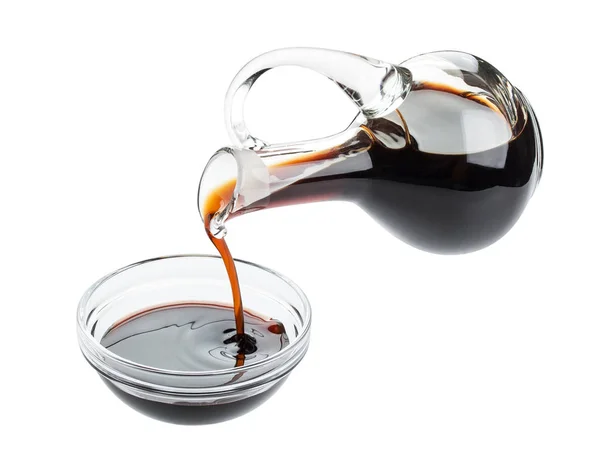Determining whether dark soy sauce is “healthy” requires a nuanced approach. It doesn’t fall into a simple “yes” or “no” category because the evidence is limited, and more studies are needed. Soy sauce has the dark and light type, would you like to know the difference? Of course yes! Now let’s get to it.
The main difference between dark and light soy sauce is their flavor and color. Dark soy sauce is thicker, less salty, and slightly sweeter than light soy sauce, and it is used mainly for adding color and flavor to dishes.
Light soy sauce, on the other hand, is saltier and used more for flavor. The difference in flavor comes from the fermentation process, with light soy sauce being fermented for a shorter time than dark soy sauce.
Both types of soy sauce contain water, fermented soybean, and salt, but dark soy sauce also contains caramel coloring. It is important to note that dark soy sauce is saltier than light soy sauce, but light soy sauce tastes saltier because dark soy sauce has a stronger soy flavor that overpowers the salty flavor.
Like any food product, soy sauce has both benefits and potential side effects. Sound Health and Lasting Wealth will explore ten key benefits and few side effects of consuming soy sauce.
Health Benefits of Soy Sauce

1. Enhances Flavor and Umami: Soy sauce adds depth and complexity to dishes, enhancing their overall taste. The umami flavor of soy sauce is highly regarded and can elevate the culinary experience [1].
2. Source of Essential Amino Acids: Soy sauce contains all the essential amino acids that our bodies need for proper functioning. These amino acids play a crucial role in building and repairing tissues, as well as supporting various bodily functions [2].
3. Antioxidant Properties: Soy sauce contains antioxidants such as flavonoids and phenolic compounds, which can help protect the body against oxidative stress and reduce the risk of chronic diseases, including cardiovascular diseases and certain types of cancer [3].
4. Potential Anti-Inflammatory Effects: Studies have shown that certain compounds in soy sauce, such as isoflavones, may possess anti-inflammatory properties. These properties may help reduce inflammation in the body and alleviate symptoms associated with inflammatory conditions [4].
5. Immune System Support: Soy sauce contains compounds that have been found to modulate immune responses, potentially enhancing the body’s defense against infections and diseases [5].
6. Digestive Health: The fermentation process involved in soy sauce production results in the formation of beneficial bacteria and enzymes. These can aid in digestion and promote a healthy gut microbiome [6, 7].
7. Potential Cardiovascular Benefits: While excessive sodium intake can contribute to high blood pressure, studies have suggested that the moderate consumption of soy sauce may have a positive impact on cardiovascular health, possibly due to its antioxidant and anti-inflammatory properties [8].
8. Weight Management: Soy sauce is a low-calorie condiment that can add flavor to meals without significantly increasing calorie intake. Incorporating soy sauce into a balanced diet may assist in weight management [9, 10 11].
9. Cultural Significance: Soy sauce is deeply rooted in Asian culinary traditions and is an important cultural symbol. Consuming soy sauce can be a way to connect with and appreciate diverse cultural heritages [12].
10. Versatility in Cooking: Soy sauce is a versatile ingredient that can be used in a wide range of dishes, from stir-fries and marinades to dressings and dipping sauces. Its versatility allows for creativity in the kitchen and the exploration of different flavors [13].
RELATED: Is soybean powder super effective for weight gain?
Side Effects of Soy Sauce

1. High Sodium Content: Soy sauce is naturally high in sodium, which can contribute to high blood pressure and increase the risk of cardiovascular diseases. Individuals with hypertension or other health conditions related to sodium intake should use soy sauce in moderation [14].
2. Allergic Reactions: Some individuals may be allergic to soy sauce due to its histamine content. Histamine intolerance can cause symptoms such as headaches, rashes, and gastrointestinal discomfort. It is important to be aware of any adverse reactions and seek medical advice if necessary [15, 16].
3. Potential Carcinogens: Certain compounds formed during the chemical production process of soy sauce may have carcinogenic properties. It is advisable to choose naturally-brewed soy sauce to minimize exposure to these unwanted compounds [17].
4. Gluten Sensitivity: Traditional soy sauce is made with wheat, making it unsuitable for individuals with gluten intolerance or celiac disease. However, gluten-free alternatives are available for those with dietary restrictions [18, 19].
5. Blood Pressure Interactions: Soy sauce contains tyramine, a naturally occurring chemical involved in blood pressure regulation. Individuals taking certain medications, such as monoamine oxidase inhibitors (MAOIs), should exercise caution when consuming soy sauce [19, 20].
DON’T MISS: A Vegan Diet with Soybeans May Significantly Reduce Hot Flashes: Exploring the Gut Microbiome Connection
Verdict:
Dark soy sauce, when enjoyed in moderation, can be part of a healthy diet. However, consider these factors:
- Sodium content: Opt for reduced-sodium varieties or use sparingly.
- Wheat and gluten: Choose brands free of these if you have sensitivities.
- MSG: Choose MSG-free brands if you’re sensitive.
Tips for healthy use:
- Use it as a finishing touch, not a main ingredient.
- Combine it with low-sodium condiments like herbs and spices.
- Monitor your overall sodium intake and balance it with low-sodium foods.
What are some dishes that use dark soy sauce
Some dishes that use dark soy sauce include:
- Beef with broccoli, where dark soy sauce is an ingredient in the sauce
- Drunken noodles, which require dark soy sauce for its distinct flavor
- Chow mein, as dark soy sauce gives the dish a deep smokiness
- Dry beef chow fun, which calls for dark soy sauce as the base flavor
- Traditional Pad See Ew, a Thai dish that uses dark soy sauce for its intense color and flavor
- Dark soy sauce is often used to add color and flavor to dishes, and its slightly sweeter and less salty profile makes it suitable for enhancing the taste of various recipes
Conclusion
Ultimately, whether dark soy sauce is “healthy” for you depends on your individual dietary needs and preferences. Soy sauce, when consumed in moderation, can be a flavorful addition to a balanced diet. It offers various benefits, including enhancing flavor, providing essential amino acids, and potentially offering antioxidant and anti-inflammatory effects. However, it is important to be mindful of its high sodium content and potential side effects, such as allergic reactions and the presence of carcinogens. Choosing naturally-brewed soy sauce and monitoring sodium intake can help individuals enjoy the benefits of soy sauce while minimizing potential risks. As with any dietary choice, it is always recommended to consult with a healthcare professional for personalized advice.
Note: This article is written based on scientific evidence found by the soundhealthandlastingwealth.com team. Sources are duly referenced and hyperlinked to source websites and are clickable for confirmation.










